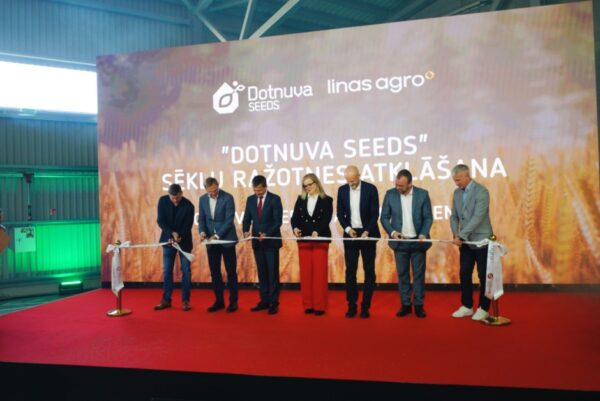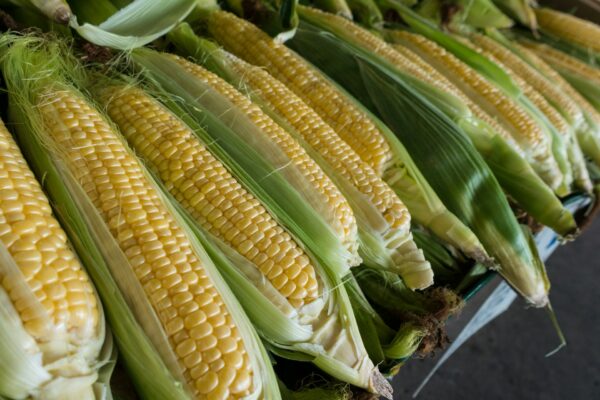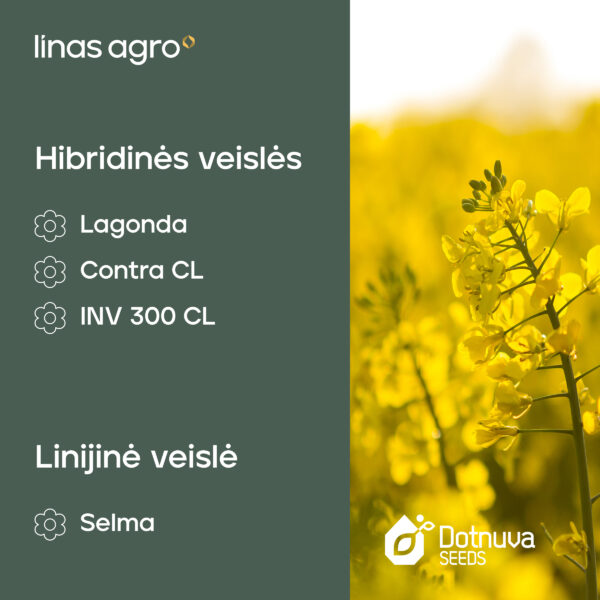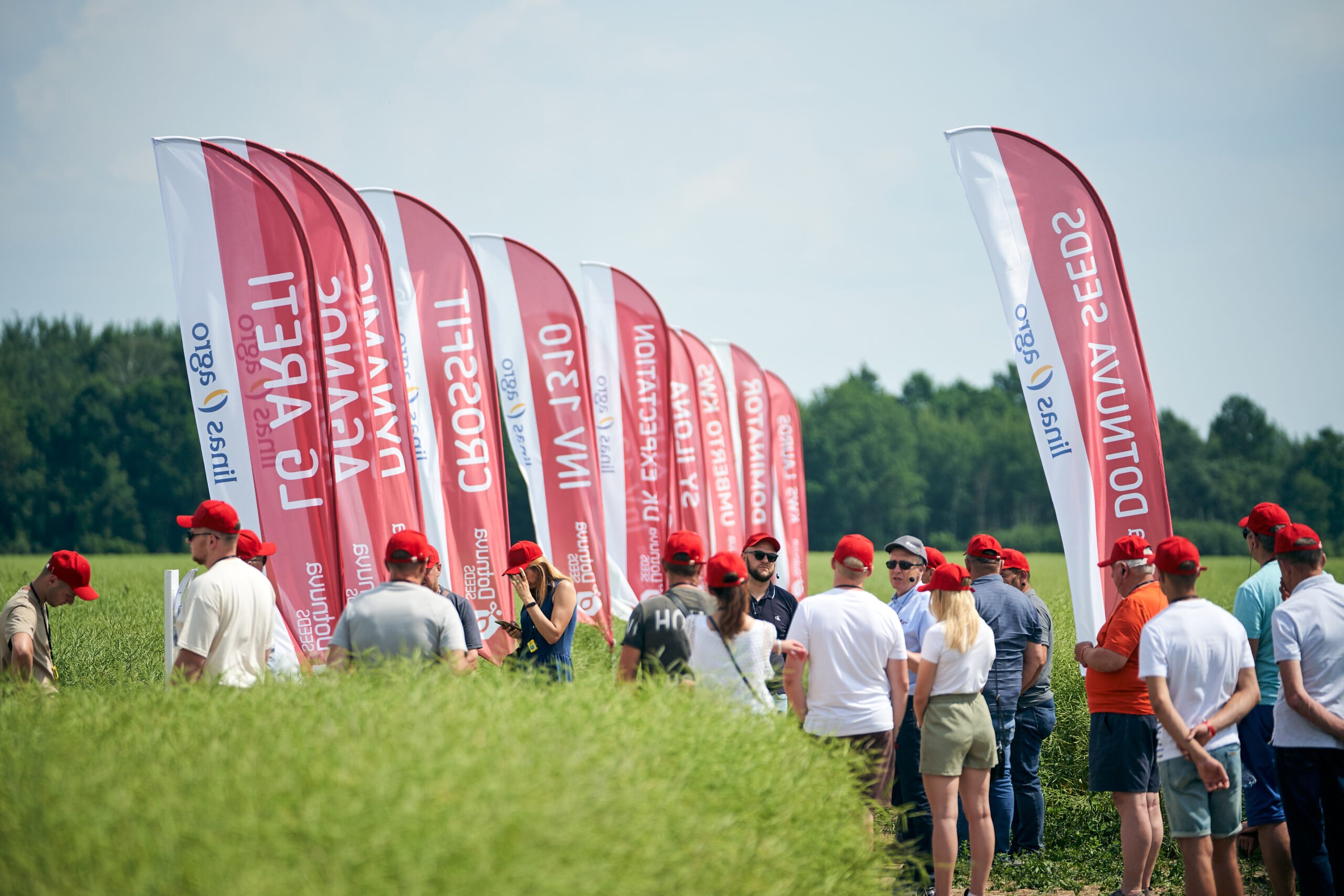
„Linas Agro“ projektas „Grūdo kelias 2023: Naujovės praktikoje“ startavo pernai rugsėjį, o birželį buvo vainikuotas dideliu renginiu ūkininkams. ŽŪB „Labūnava“ įrengtuose eksperimentiniuose kviečių, rapsų ir pupų bandymuose mokslininkai ir agrotechnologai siekė atrasti naujus agrotechnologinius sprendimus, kurie leistų tvariau ir efektyviau užauginti pasėlius, gauti didesnį derlių. Šiandien AB „Linas Agro“ jau turi tyrimų rezultatus, kuriais atvirai dalijasi su visuomene.
„Turiu pripažinti, kad kai kurie „Grūdo kelio 2023: Naujovės praktikoje“ rezultatai nustebino ir mane, jau daug visko mačiusią,- pokalbį pradeda Gabrielė. – Kai kurie dalykai, tokie kaip dirvinių herbicidų ar trąšų efektyvumo rezultatai, nors džiugina, tačiau jau nebestebina, to ir galėjome tikėtis, tačiau tai, ką atradome tyrimuose su fungicidais ir bakterijomis, privertė išsižioti iš nuostabos“.
Dirvinių herbicidų veiksmingumas sausros sąlygomis
„Šiuose tyrimuose dar kartą įsitikinome, kad dirviniai herbicidai veikia kaip draudimo bilietas. Kad ir koks sausas buvo pernai metų ruduo, tiek rapsų, tiek ir kviečių pasėliuose herbicidai suveikė puikiai ir davė gerus rezultatus. Efektyvumas pasireiškė visuose mūsų ruoštuose mišiniuose, purškiant tiek rudenį, tiek ir pavasarį. Svarbu paminėti, kad visuose mišiniuose herbicidų normos buvo sumažintos pagal „ADAMA“, „Corteva“, „Syngenta“, „Nufarm“ ir „BASF“ produktų rekomendacijas, mat herbicidai mišiniuose visuomet geriau suveikia. Tai ypatingai svarbu žinoti tiems, kurie siekia ūkininkauti tvariau ir tuo pačiu išleisti mažiau,- tikina Gabrielė Pšibišauskienė.- Pavyzdžiui, naikinant javų pabiras rapsų laukuose ir atliekant savalaikį purškimą, galima „Fusilade forte 150 EC“ normą sumažinti iki 0,5 l/ha., kas leidžia aukštą efektyvumą su optimaliomis investicijomis‘‘.
Tačiau G. Pšibišauskienė pabrėžia, kad herbicidų mišiniai mažomis normomis puikiai atliks savo darbą tik gerai prižiūrimuose laukuose, kuriuose nėra smarkiai paplitusios rezistentiškos, agresyvios piktžolės. Gera žinia, kad gerai kontroliuojamų laukų, pasak mokslų daktarės, Lietuvoje yra tikrai daug.
Augimo reguliatoriai – tik kartu su fungicidais
Žieminių rapsų laukuose atliktas augimo reguliatorių efektyvumo tyrimas patvirtino šių pesticidų veiksmingumą. Rudenį naudojami augimo reguliatoriai užtikrino, kad rapsai neperaugtų – neištįstų kaklelis ir žiemos metu nenušaltų. O pavasarį naudojami augimo reguliatoriai padidino augalo šakų skaičių, kas vėliau sugeneravo didesnį derlių.
„Norint pasiekti gerą rezultatą, rapsų agrotechnologijoje augimo reguliatoriai gali būti naudojami vieną, du ar tris kartus – rudenį ir pavasarį, ir visuomet mišinyje kartu su fungicidais. Taip jie bus žymiai efektyvesni – kur kas efektyviau didins šakų skaičių, mažins aukštį ir generuos didesnį derlių.
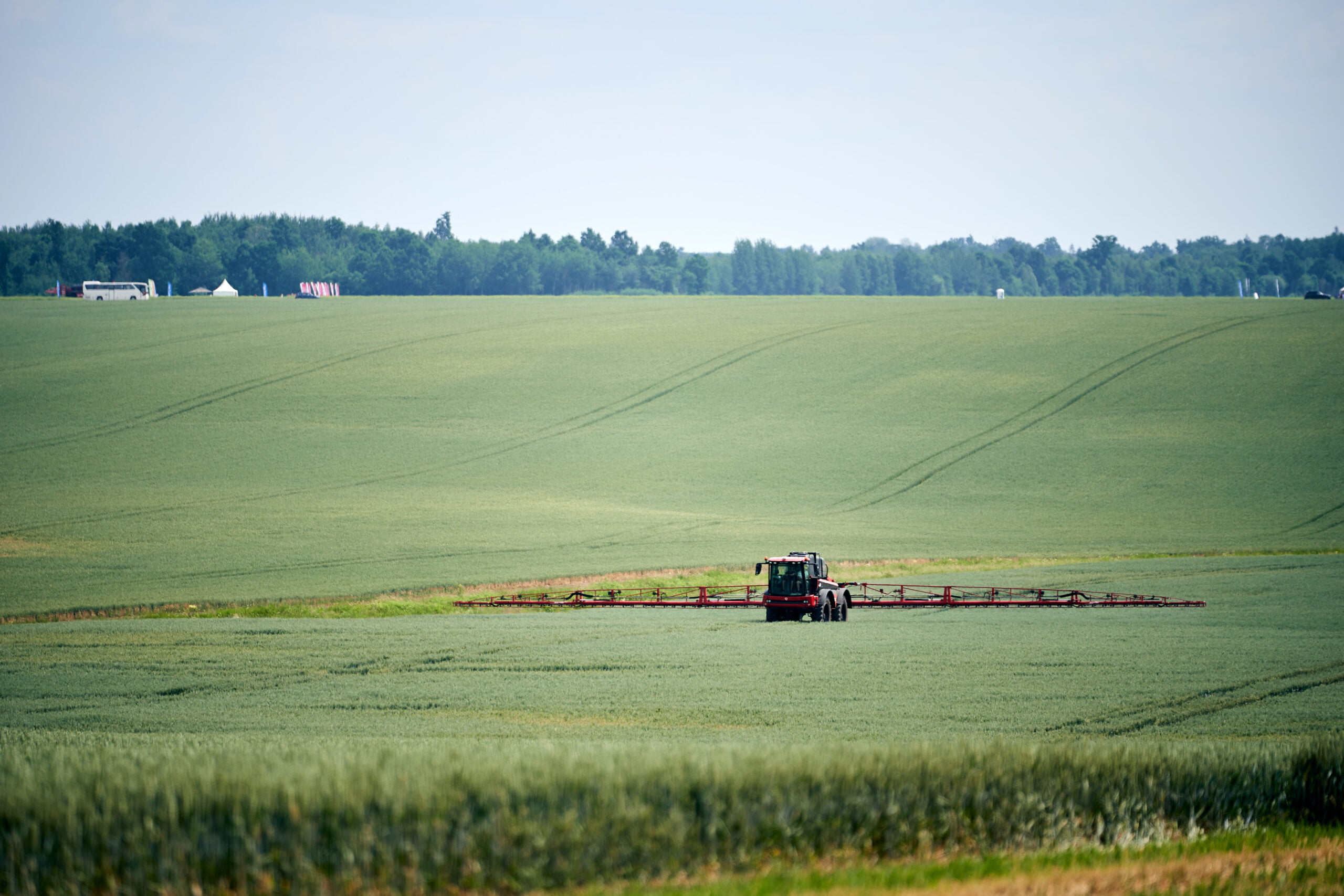
Bandymas buvo įrengtas žieminių rapsų „DYNAMIC“ pasėlyje, kuris buvo nehomogeniškas, pasižymėjo įvairaus augumo augalais, išretėjęs. Pasėlio suvienodinimui pasirinkome „Juventus 90“, „Toprex 375 SC” ir „Orius 250 EW“, šiuos produktus lyginome su rinkoje esančiais ir gamyboje naudojamais mišiniais“,- dalijasi G. Pšibišauskienė.
2023 m., remiantis LAMMCŽI užsakomųjų bandymų tyrimų rezultatais, paminėti produktai žieminių rapsų derlių padidino atitinkamai „Juventus 90“ – 15 proc., „Toprex 375 SC” – 13 proc. ir „Orius 250 EW“ – 3 proc., lyginant su nepurkštais. Be to, šie tyrimai parodė, kad „silpnuose“ pasėliuose, naudojant nesumažintas augimo reguliatorių ir fungicidų mišinių normas, galimi ir derliaus nuostoliai.
Tinkama trąšų technologija derliaus priedą generuoja net iki 600 kg iš ha
„Žieminiuose kviečiuose ETANA įrengėme „YARA Lietuva“ trąšų bandymą. Pasėliams buvo naudojamos birios trąšos – „YaraMila NPK (S) 14-14-21 (6)” ir „YaraBela AXAN NS 27-4”. Taip pat keletą kartų buvo atiekami purškimai mikroelementais ir makroelementais per lapus: „YaraVita KOMBIPHOS“, „YaraVita GRAMITREL“ ir „YaraVita UNIVERSAL BIO“. Kokybei pagerinti naudotas „YaraBela AXAN NS 27-4” ir „YaraVita THIOTRAC“ trąšų derinys.
Lyginant su įprastine technologija, kurią naudoja ŽŪB „Labūnava“, taikant „YARA Lietuva“ technologiją, derlius buvo gautas didesnis. Derliaus priedas – 600 kg iš ha. Tai jau esminis skirtumas”,- rezultatais dalijasi Gabrielė Pšibišauskienė.
Kitas bandymas buvo atliekamas su „Agonutrition” mikroelementiniais ir makroelementiniais mišiniais. Kaip dalijasi G. Pšibišauskienė, čia norėta pasižiūrėti, ar būtų derliaus skirtumas, jei trąšų ant augalo būtų naudojama daugiau, nei rekomenduoja pats gamintojas. Ir kaip atskleidė tyrimų rezultatai – esminio skirtumo nebūtų.
„ŽŪB „Labūnava“ specialistai itin tausoja savo žemės ūkio naudmenas: taiko dirvos savybes gerinančią sėjomainą, tręšia organinėmis trąšomis, augina posėlinius augalus bei žolynus sėjomainose. Dėl paminėtų dirvos gerinimo savybių, pasėliams padidinus mikroelementinius ir makroelementinius purškimus per lapus, esminio skirtumo negauname, nes augalai geba įsisavinti dirvoje esančias maisto medžiagas.
Mikroelementinių ir makroelementinių mišinių panaudojimas tampa svarbus tik esant stresinėms aplinkybėms, tokioms kaip sausra ar šaltis, kas ir buvo būdinga 2023 metų šiltajam sezonui. Augalus vargino šaltas pavasaris ir sausringa vasaros pradžia“,- patirtimi dalijasi dr. Gabrielė Pšibišauskienė.
Nustebino azotą fiksuojančių bakterijų sąveika su biostimuliatoriais
„Grūdo kelio 2023” tyrimuose man tikras atradimas buvo tai, kaip tarpusavyje sąveikauja azotą fiksuojančios bakterijos kartu su biostimuliatoriais. Aš supratau, kad šitie mikroorganizmai yra veiklūs tik tada, kada veiksnus yra augalas. Jei jis yra sveikas, gyvybiškai aktyvus, tai šios bakterijos, fiksuojančios azotą, jam padeda. Bet jei augalas stresuoja, bakterijos taip pat stresuoja. Bakterijas reikia skatinti gyventi taip pat kaip ir augalą, nes jos taip pat yra augalo dalis, augalo gyventojos. Štai kodėl technologijoje, kurioje naudojamos azotą fiksuojančios bakterijos, privaloma naudoti ir biostimuliatorius, augalą papildančius jam reikalingais komponentais: amino rūgštimis, polisacharidais, cinku, manganu. Taip biostimuliatoriai skatins gyventi ne tik augalą, bet ir bakterijas“,- tikina agrotechnologijų mokslų daktarė.
Į AB „Linas Agro“ 2023 m. azoto fiksavimo per lapus bakterinių preparatų bandymą buvo įtraukti „Corteva Agriscience“, „Nando“ ir „Agronutrition“ analogišką funkciją augaluose atliekantys produktai: „Utrisha™ N“, „BioN“ ir „N-Leaf“. „IKAR“ biostimuliatoriai – „Revolt“ ir „Ocean“, patręštuose ŽŪB „Labūnava“ laukuose atsiskleidė kaip itin efektyvus agrotechnologinis sprendimas: vienkartinis šių produktų panaudojimas žiemiuose kviečiuose BBCH 31 davė 60 kg derliaus priedą. Tai reiškia, kad naudodami biostimuliatorius visą augalo intensyvaus augimo periodą, galėtume gauti didžiausią derliaus naudą.
Fungicidai – ne tik apsaugai nuo kenkėjų. Jų rolė kur kas svarbesnė
Gabrielė Pšibišauskienė dalijasi, kad pavasarį pesticidų prekybos vadovas Darius Poškaitis, pesticidų produkto ekspertas Petras Kiseliovas ir ŽŪB „Labūnava“ komanda turėjo intensyvias diskusijas dėl kviečių purškimo fungicidais. Fiksuotas itin mažas ligų – septoriozės ir dryžligės, paplitimas, tad buvo svarstoma kurio vieno iš dviejų purškimų atsisakyti: 2023 m. birželio 14 d., žieminiams kviečiams „ETANA“ esant BBCH 65 tarpsnyje, 3 lape (1 ir 2 lapai be pažeidimų) fiksuotas vidutiniškai 0,25 proc. septoriozės, 0,44 proc. miltligės ir 0,13 proc. dryžligės. Po dviejų savaičių, kviečiams esant BBCH 75 tarpsnyje, nustatytas 2,56 proc. septoriozės ir 3,94 proc. dryžligės intensyvumas.
Tai rodo, kad pažeidimai buvo itin maži. Tačiau, visgi, purškimų fungicidais nuspręsta neatsisakyti ir tai, ką atskleidė rezultatai, visus gerokai nustebino. Gautas kviečių derlius dėl naudotų fungicidų buvo net 606-790 kg didesnis nei ten, kur fungicidai naudoti nebuvo.
Fungicidas „Revytrex” 1,0 l/ha derlių padidino 716 kg/ha, o „Soratel” 0,5 l/ha ir „Mirador” 0,5 l/ha fungicidų mišinys žieminių kviečių „Etana“ derlių padidino puse tonos. Panaudojus „Elatus Era” fungicidą, derlius padidėjo net iki 790 kg/ha.
Pirmasis fungicidinis ŽŪB „Labūnava“ sėjomaininio lauko purškimas ir minėto fungicidinio bandymo (T1) purškimas, kai žieminiai kviečiai buvo BBCH 31 tarpsnyje, atliktas su herbicidu „Delaro Forte” 1,3 L/ha.
Tai reiškia, kad fungicidai augalų augimo technologijose sausringu periodu stiprina augalo imunitetą, suteikia žalinimo efektą: leidžia augalui geriau įsisavinti medžiagas, išlaikyti augalą žalią ir duoda derliaus priedą net ir nesant intensyvaus išplitimo ligų. Plačiau gauti rezultatai bus pristatyti „Linas Agro“ pavasarinių seminarų metu.
Žemės ūkio bendrovės „Labūnava“ sėjomaininiai laukai, kurie įėjo į „Grūdo kelio 2023“ bandymų platformą, buvo purškiami itin tikslaus išpurškimo savaeigiais purkštuvais „Agrifac Condor” ir „Agrifac Endurance”.
Žieminių kviečių veislių derliai viršijo lūkesčius
„Grūdo kelio 2023” tyrimų rezultatai stebino ir veislių bandymų laukuose. Anot „Dotnuva Seeds“ vykdomojo direktoriaus Sigito Augo, žieminių augalų derliaus prognozės, užsitęsus sausringam periodui, buvo pesimistinės, tačiau jos nepasitvirtino. Žieminių kviečių veislių bandyme kviečių derlingumas šiais metais buvo net 25 proc. didesnis nei pernai.
Tačiau vasarinių augalų pasėliai, ypač vasarinių kviečių, avižų, pupų, stipriai nukentėjo nuo sausros. Vasarinių augalų veislių bandymuose derliai buvo 18-33 proc. mažesni nei praeitais metais.
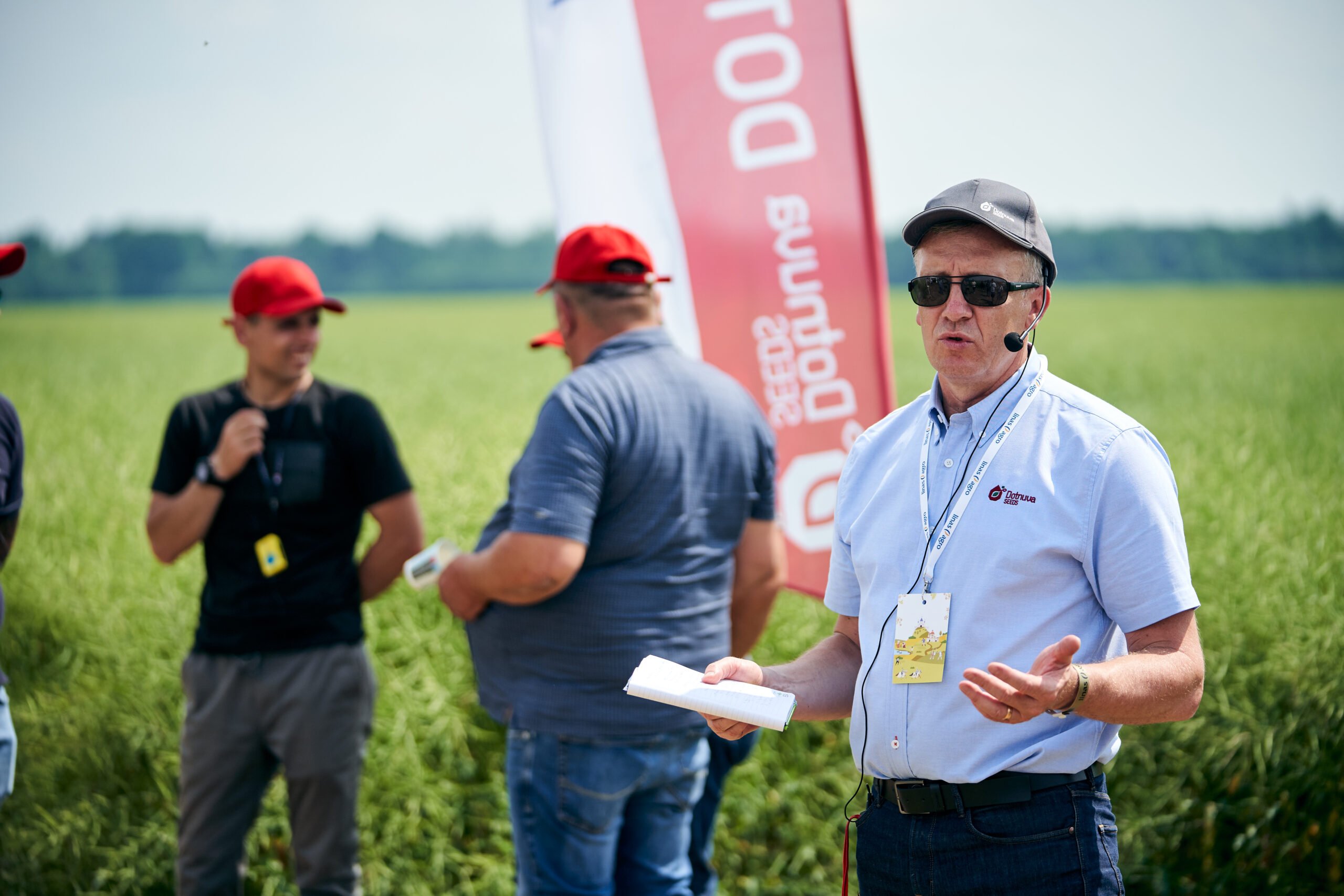
Kaip tvirtina Sigitas Augas, iš visų „Grūdo kelio 2023” bandymų platformoje tirtų, rinkoje jau esančių žieminių kviečių veislių, geriausiai pasirodė veislės – „LG Nida“, „Asory“ ir „Etana“. Jų derlingumas, lyginant su standartinėmis veislėmis, buvo 101-103 proc. Kokybės klasė vyravo antra. Žemesnę klasę lėmė prastesni baltymų ir glitimo rodikliai.
„Įvertinus visas veislių savybes, kokybę, derlingumą, atsirinkome naujų veislių, kurios pasirodė daug pranašesnės už standartines. Jų tyrimai tęsiami, o keletas pačių perspektyviausių yra perduotos tyrimams į Lietuvos valstybinį augalų veislių tyrimo centrą“, – sako Sigitas Augas.
„Žieminių rapsų veislių derlius nebuvo imamas, nes 2022 m. rudenį po rapsų sėjos nusistovėjus sausringam periodui, rapsai labai netolygiai sudygo. Buvo nuspręsta bandymą išbrokuoti ir rapsų veislių derlingumų nevertinti. Bandymas buvo paliktas tik vizualiam veislių stebėjimui. Tačiau pavyko nuimti derlių iš demonstracinių laukų, kurie buvo pasėti Šakių, Pasvalio ir Joniškio rajonuose. Vidutinis šių bandymų derlingumas nustatytas 4,72 t/ha, o didžiausią derlių gavome šių veislių: „Janosh“ (5,29 t/ha), „Dominator“ (4,95 t/ha), „KWS Lauros“ (4,88 t/ha) ir „InV 1310“ (4,75 t/ha)“,- tyrimų rezultatus apibendrino „Dotnuva Seeds“ vykdomasis direktorius Sigitas Augas.
Atlikti šiltnamio efektą sukeliančių dujų emisijų skaičiavimai
Be minėtų „Grūdo kelias 2023: Naujovės praktikoje“ tyrimų, ŽŪB „Labūnava“ žieminių kviečių, žieminių rapsų ir pupų laukuose buvo atliekami šiltnamio efektą sukeliančių dujų (ŠESD) emisijų skaičiavimai, kurių vertės priklauso nuo technologijoje naudojamų skirtingų trąšų naudojimo, jų kiekio, augalų apsaugos priemonių įvairovės, žemės dirbimo ir pasėlių priežiūros operacijų skaičiaus.
Remiantis MB „Biogalia“ skaičiavimais, nustatytos ŠESD emisijos: pupoms – 1440,7 kgCO2ekv/ha, žieminiams rapsams – 1121,1 kgCO2ekv/ha ir žieminiams kviečiams – 1204,9 kgCO2ekv/ha.
Kaip rodo gauti rezultatai, išmetamų emisijų kiekis dėl pasirinktos žemės ūkio technikos (itin tikslaus išpurškimo savaeigių purkštuvų „Agrifac Condor” ir „Agrifac Endurance), leido sumažinti įvažiavimų į laukus skaičių ir taip pasiekti mažesnių nei vidutinių dujų išmetimo verčių.
AB „Linas Agro“ dėkoja visiems partneriams, o ypatingai – ŽŪB „Labūnava“ komandai, už nuoširdų bendradarbiavimą viso „Grūdo kelias 2023: Naujovės praktikoje“ projekto metu.
